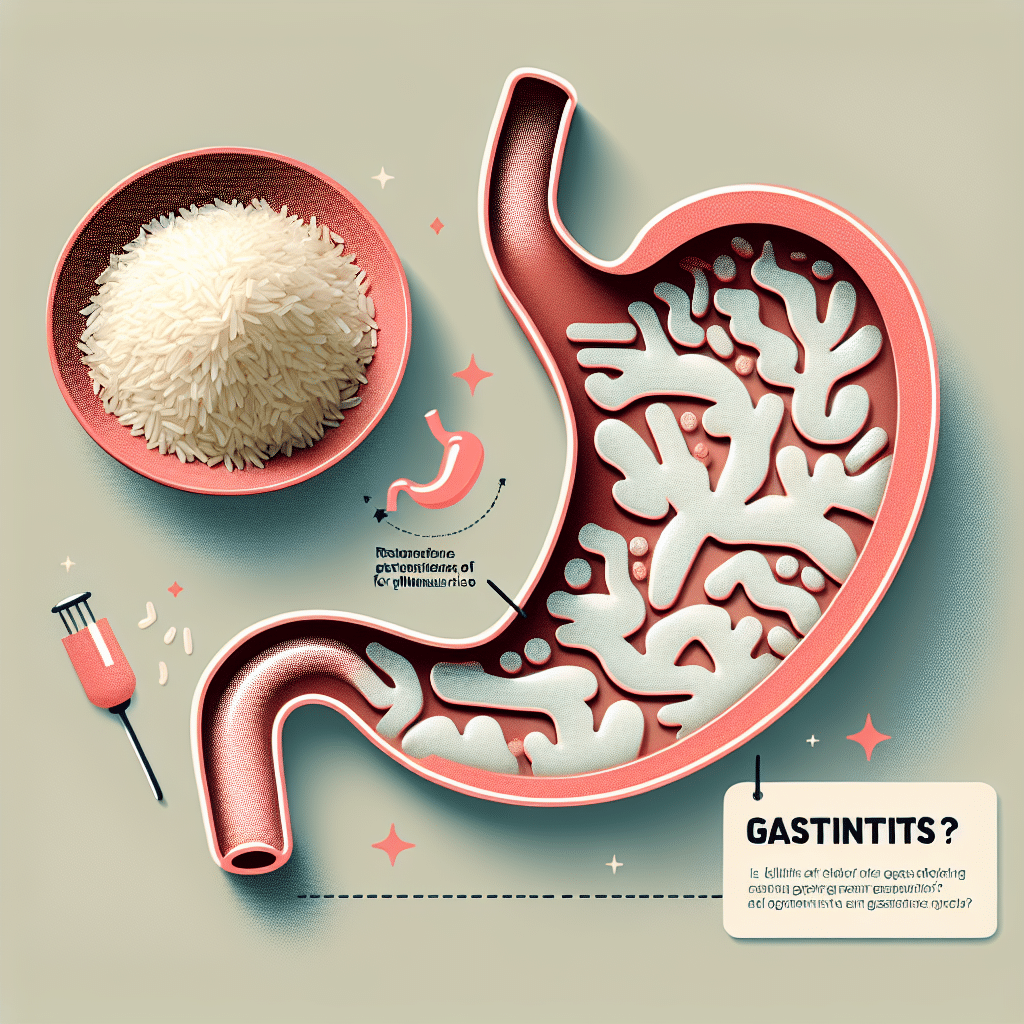Is Glutinous Rice Good For Gastritis?
-
Table of Contents
- Glutinous Rice and Gastritis: A Comprehensive Analysis
- Understanding Gastritis
- The Role of Diet in Gastritis Management
- Glutinous Rice: An Overview
- Is Glutinous Rice Good for Gastritis?
- Scientific Evidence and Expert Opinions
- Case Studies and Anecdotal Reports
- Preparing Glutinous Rice for Gastritis Patients
- Conclusion: Weighing the Pros and Cons
- ETprotein’s Protein Products: A Gastritis-Friendly Option
Glutinous Rice and Gastritis: A Comprehensive Analysis

Gastritis, an inflammation of the stomach lining, affects millions of people worldwide. Diet plays a crucial role in managing this condition, and choosing the right foods can alleviate symptoms and promote healing. Glutinous rice, also known as sticky rice, is a staple in various cuisines, particularly in Asia. This article delves into whether glutinous rice is beneficial for individuals suffering from gastritis.
Understanding Gastritis
Gastritis is characterized by a range of symptoms, including abdominal pain, bloating, nausea, and in severe cases, bleeding. It can be caused by various factors such as Helicobacter pylori infection, long-term use of nonsteroidal anti-inflammatory drugs (NSAIDs), excessive alcohol consumption, and stress.
The Role of Diet in Gastritis Management
Dietary choices can significantly impact the severity and management of gastritis. Foods that are spicy, acidic, or high in fat can aggravate the stomach lining, while bland, non-irritating foods are generally recommended to ease symptoms.
Glutinous Rice: An Overview
Glutinous rice is a type of short-grain rice that becomes sticky when cooked due to its high amylopectin content. It is often used in dishes like sushi, mochi, and various desserts. Despite its name, glutinous rice is gluten-free and should not be confused with gluten-containing grains.
Is Glutinous Rice Good for Gastritis?
When considering glutinous rice for gastritis, it’s essential to examine its properties and how they may affect the stomach lining.
- Mild and Easily Digestible: Glutinous rice is generally mild and easy on the stomach, making it a potentially good choice for those with gastritis.
- Low Fiber Content: High-fiber foods can be harsh on a sensitive stomach, but glutinous rice’s low fiber content may be less irritating for gastritis sufferers.
- Gluten-Free: For individuals with gluten sensitivity or celiac disease, glutinous rice is a safe option that won’t trigger symptoms related to gluten ingestion.
However, it’s important to note that individual responses to foods can vary. Some people with gastritis may find that glutinous rice is well-tolerated, while others may experience discomfort.
Scientific Evidence and Expert Opinions
Research on the specific effects of glutinous rice on gastritis is limited. However, studies on dietary patterns and gastritis suggest that a diet consisting of easily digestible, non-irritating foods can be beneficial. Health professionals often recommend a bland diet during gastritis flare-ups, which may include foods like glutinous rice.
Case Studies and Anecdotal Reports
While scientific studies are sparse, anecdotal evidence from individuals with gastritis suggests that glutinous rice can be a soothing food option during flare-ups. Some report that consuming glutinous rice in moderation helps manage their symptoms and provides a comforting, easy-to-digest meal.
Preparing Glutinous Rice for Gastritis Patients
For those with gastritis who wish to include glutinous rice in their diet, preparation methods should be considered to minimize potential irritation:
- Cooking glutinous rice with plenty of water can make it softer and easier to digest.
- Avoiding the addition of spicy or acidic ingredients can help prevent aggravation of the stomach lining.
- Pairing glutinous rice with other gastritis-friendly foods, such as lean proteins and steamed vegetables, can create a balanced meal.
Conclusion: Weighing the Pros and Cons
In conclusion, glutinous rice may be a suitable dietary option for some individuals with gastritis due to its mildness and ease of digestion. However, it’s crucial to listen to your body and consult with a healthcare professional to tailor your diet to your specific needs. As with any condition, individual experiences may vary, and what works for one person may not work for another.
ETprotein’s Protein Products: A Gastritis-Friendly Option
For those managing gastritis and seeking additional protein sources that are gentle on the stomach, ETprotein offers a range of organic, non-GMO, and allergen-free protein products. Their selection includes organic rice protein, which can be an excellent alternative for individuals with gastritis looking to maintain their protein intake without irritating their stomach lining.
ETprotein’s commitment to quality ensures that their products are not only safe for those with dietary restrictions but also provide the necessary nutrients to support overall health. Whether you’re dealing with gastritis or simply looking for high-quality protein options, ETprotein has you covered.
About ETprotein:
ETprotein, a reputable protein and L-(+)-Ergothioneine (EGT) Chinese factory manufacturer and supplier, is renowned for producing, stocking, exporting, and delivering the highest quality organic bulk vegan proteins and L-(+)-Ergothioneine. They include Organic rice protein, clear rice protein, pea protein, clear pea protein, watermelon seed protein, pumpkin seed protein, sunflower seed protein, mung bean protein, peanut protein, and L-(+)-Ergothioneine EGT Pharmaceutical grade, L-(+)-Ergothioneine EGT food grade, L-(+)-Ergothioneine EGT cosmetic grade, L-(+)-Ergothioneine EGT reference grade and L-(+)-Ergothioneine EGT standard. Their offerings, characterized by a neutral taste, non-GMO, allergen-free attributes, with L-(+)-Ergothioneine purity over 98%, 99%, cater to a diverse range of industries. They serve nutraceutical, pharmaceutical, cosmeceutical, veterinary, as well as food and beverage finished product distributors, traders, and manufacturers across Europe, USA, Canada, Australia, Thailand, Japan, Korea, Brazil, and Chile, among others.
ETprotein specialization includes exporting and delivering tailor-made protein powder and finished nutritional supplements. Their extensive product range covers sectors like Food and Beverage, Sports Nutrition, Weight Management, Dietary Supplements, Health and Wellness Products, and Infant Formula, ensuring comprehensive solutions to meet all your protein needs.
As a trusted company by leading global food and beverage brands and Fortune 500 companies, ETprotein reinforces China’s reputation in the global arena. For more information or to sample their products, please contact them and email sales(at)ETprotein.com today.












